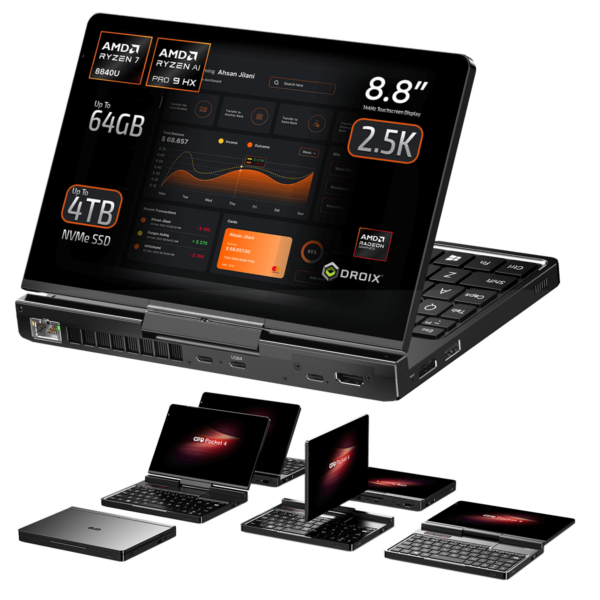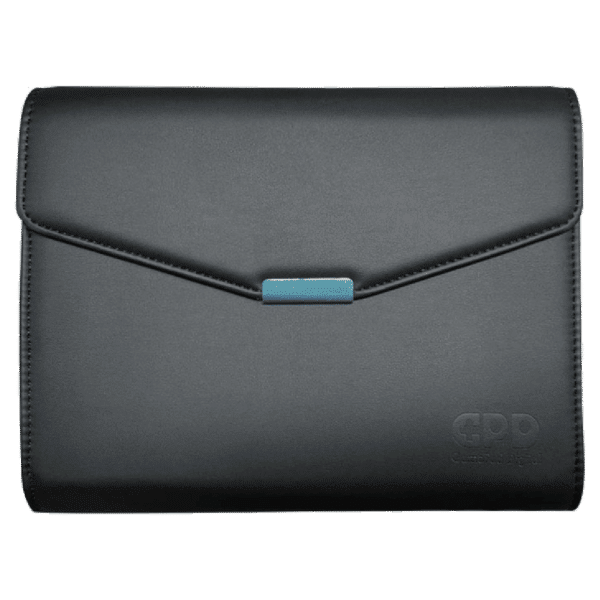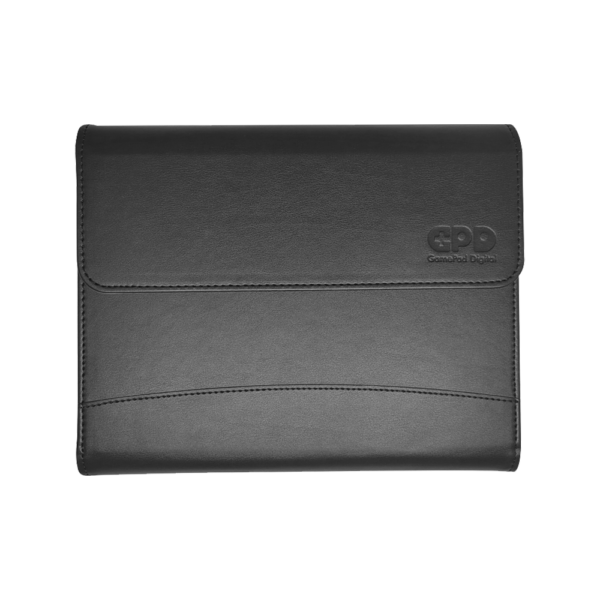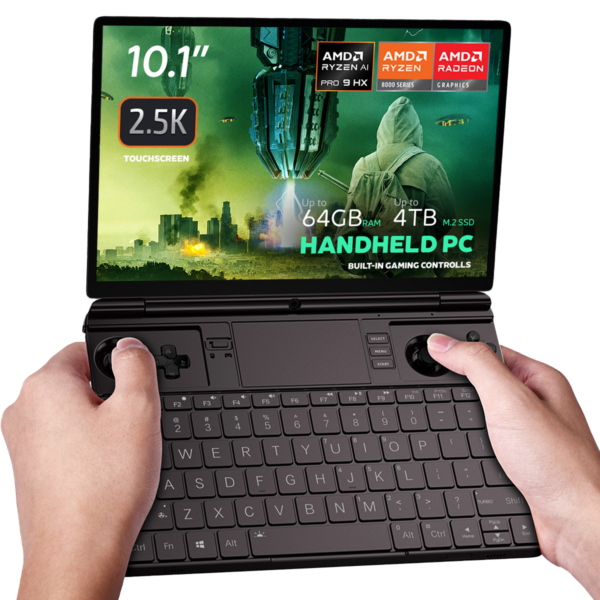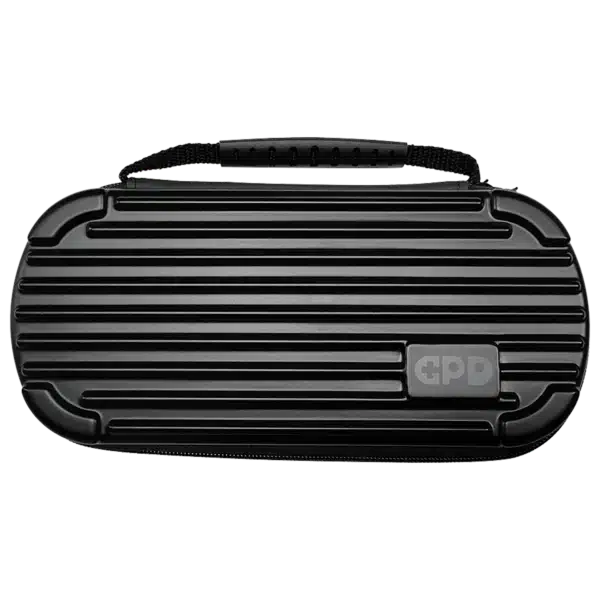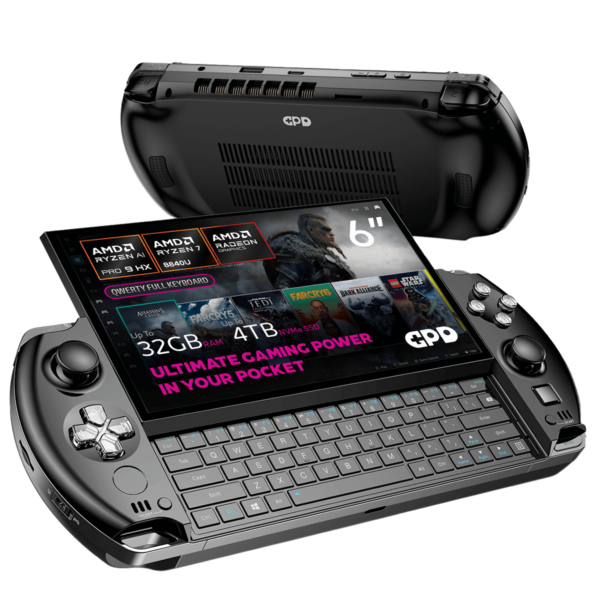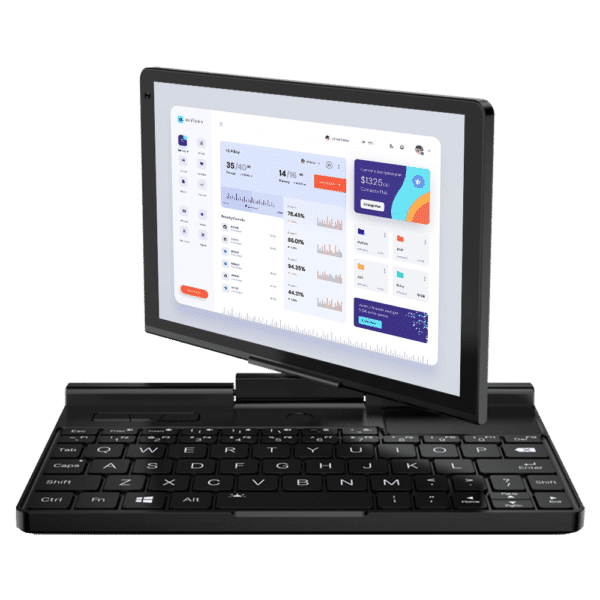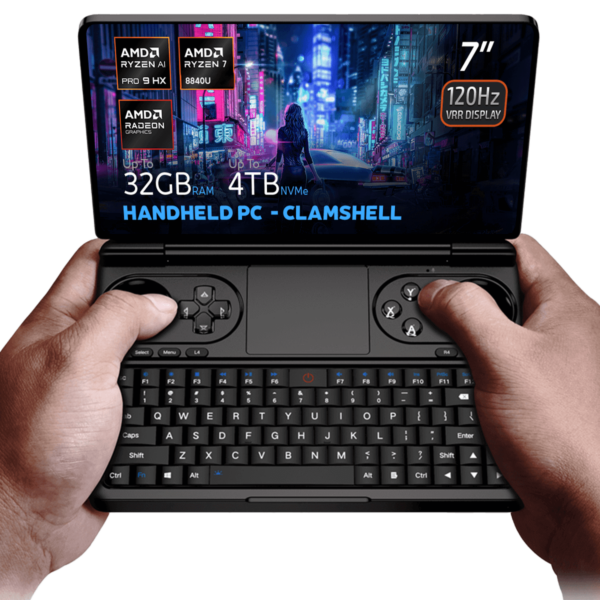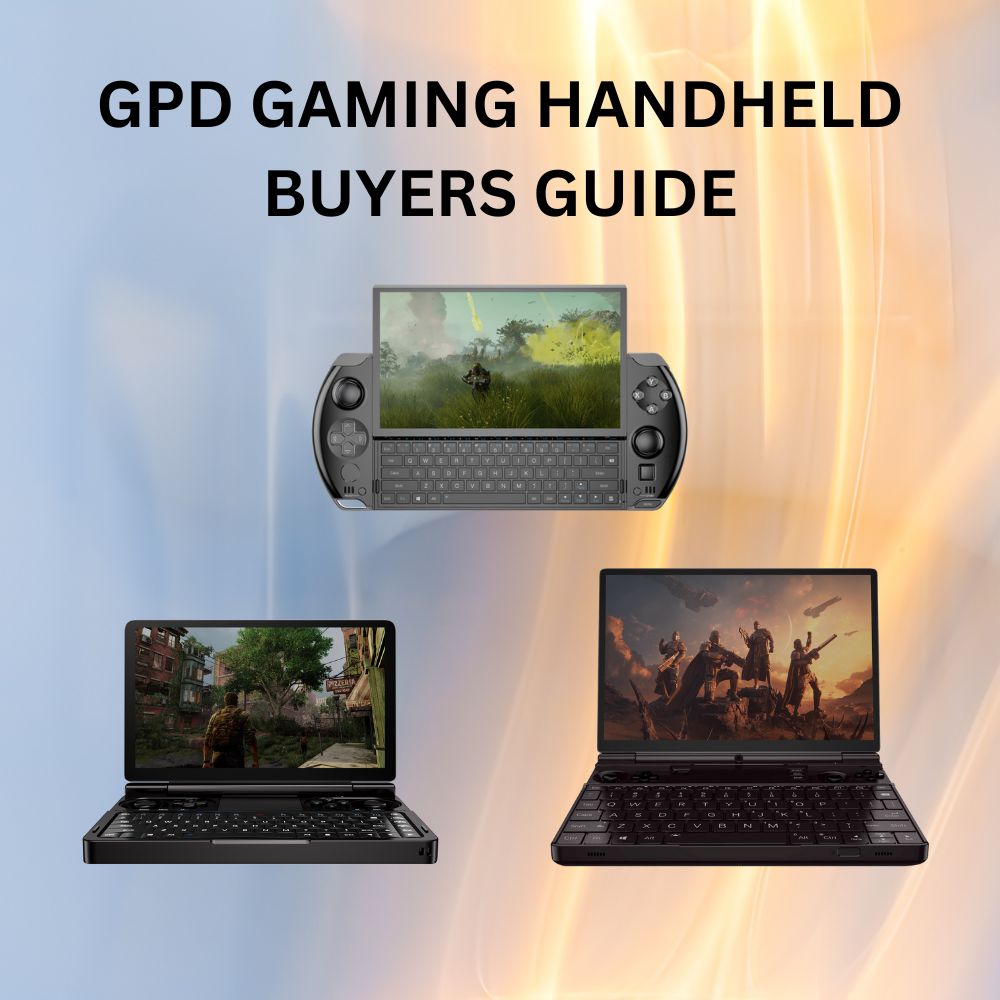
GPD Handheld PC for Gaming Buyer’s Guide: What to Consider Before You Buy
GPD, a leader in the handheld gaming PC market since 2016, offers a diverse lineup of devices including the GPD WIN 4 2024, GPD WIN Mini 2024, and GPD WIN MAX 2 2024. Each are designed to meet varying user needs with features like compact slide-up designs, ultra-portable clamshells, and robust AMD Ryzen processors, providing options that balance portability, performance, and gaming comfort. In our handheld PC for gaming buyers guide we discuss the differences between the three models with an aim to provide the best fit for your requirements.
Comparing Handheld Gaming PC Form Factors
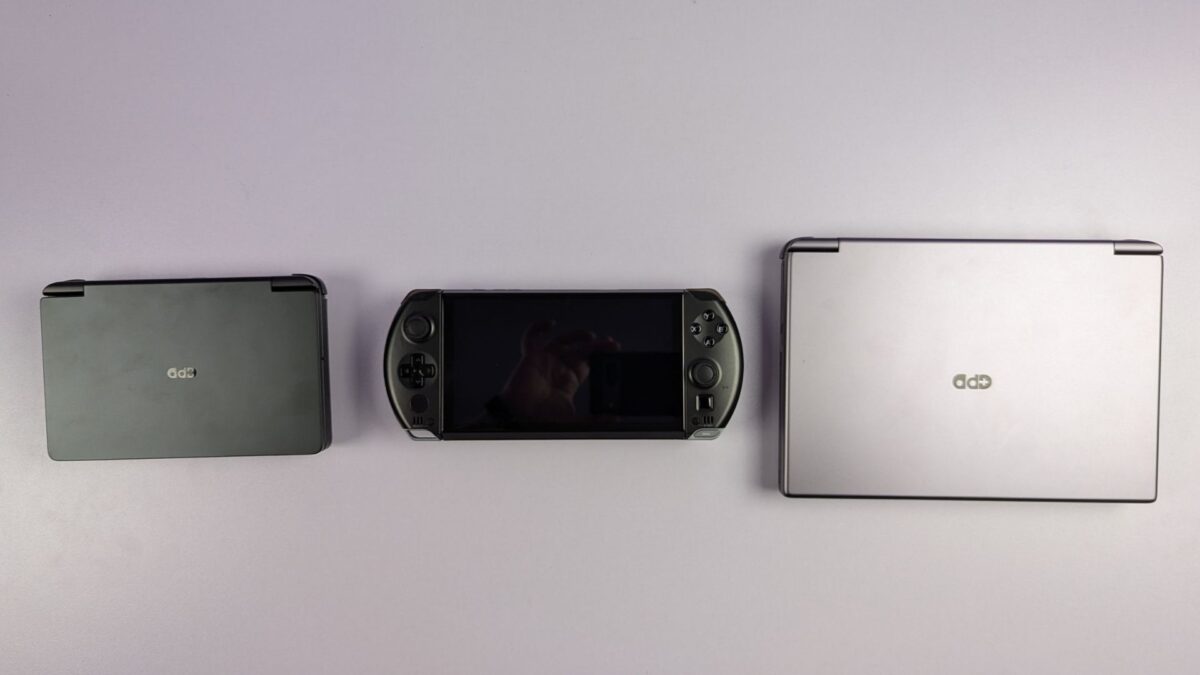
The GPD WIN 4 2024, GPD WIN Mini 2024, and GPD WIN MAX 2 2024 offer distinct form factors catering to different portability needs. The WIN 4 2024 features a compact slide-up design, making it highly portable for on-the-go gaming.
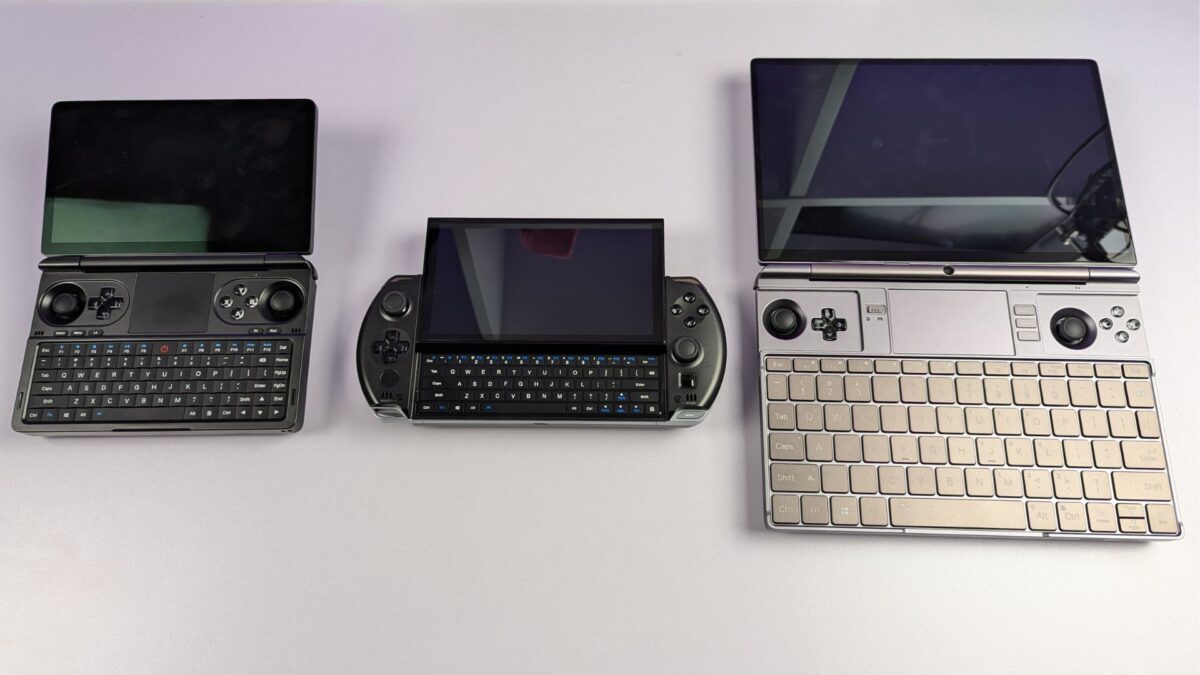
The WIN Mini 2024 takes portability further with its ultra-compact clamshell form factor, ideal for users prioritizing extreme portability.
In contrast, the GPD WIN MAX 2 2024 adopts a larger form factor, balancing portability with a more spacious screen and keyboard layout, suitable for users who prefer a more laptop-like experience. Each design offers trade-offs between screen size, keyboard comfort, and overall portability, allowing users to choose based on their specific gaming and mobility requirements.
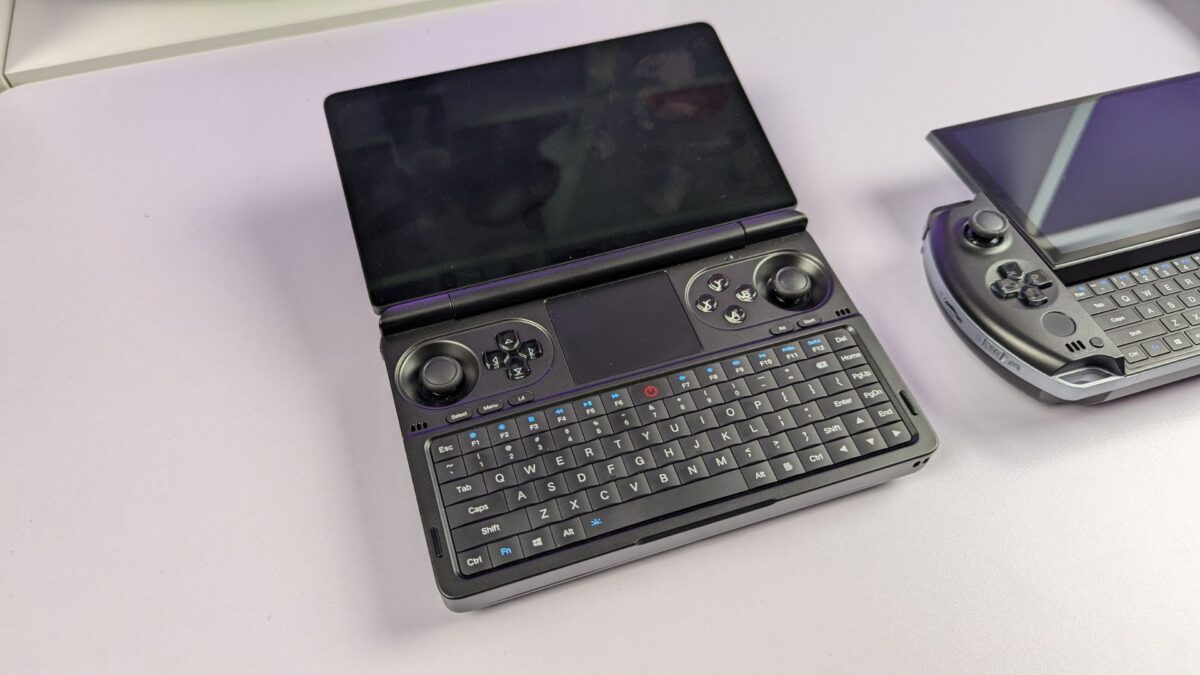
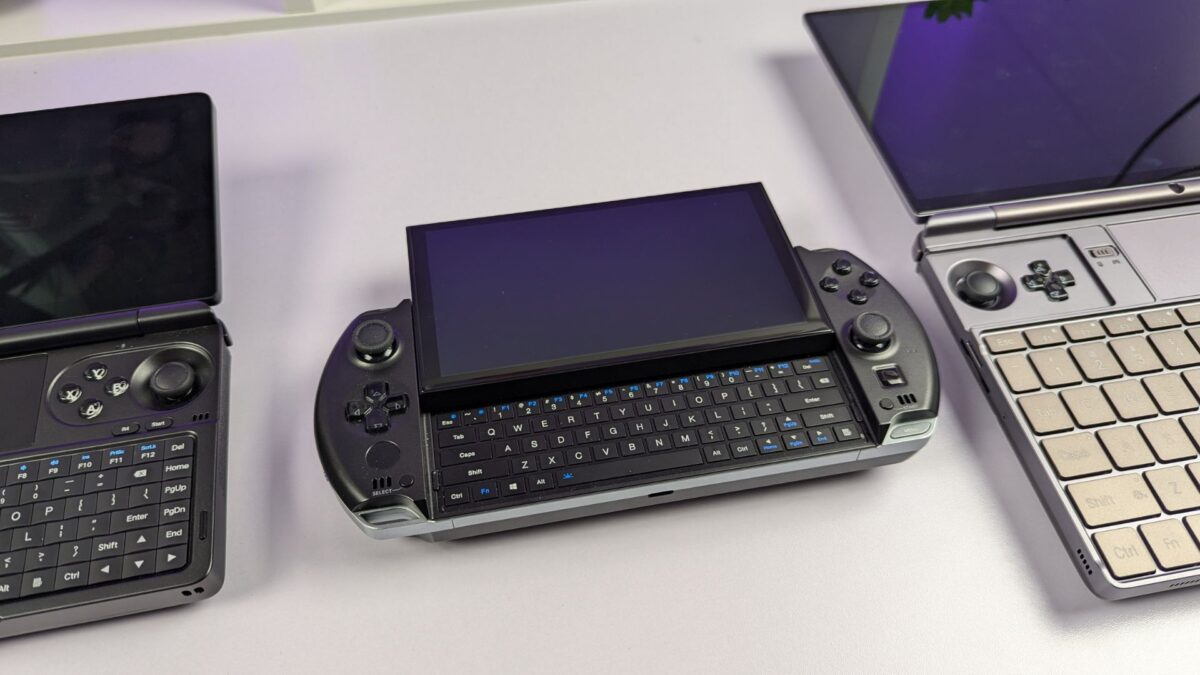
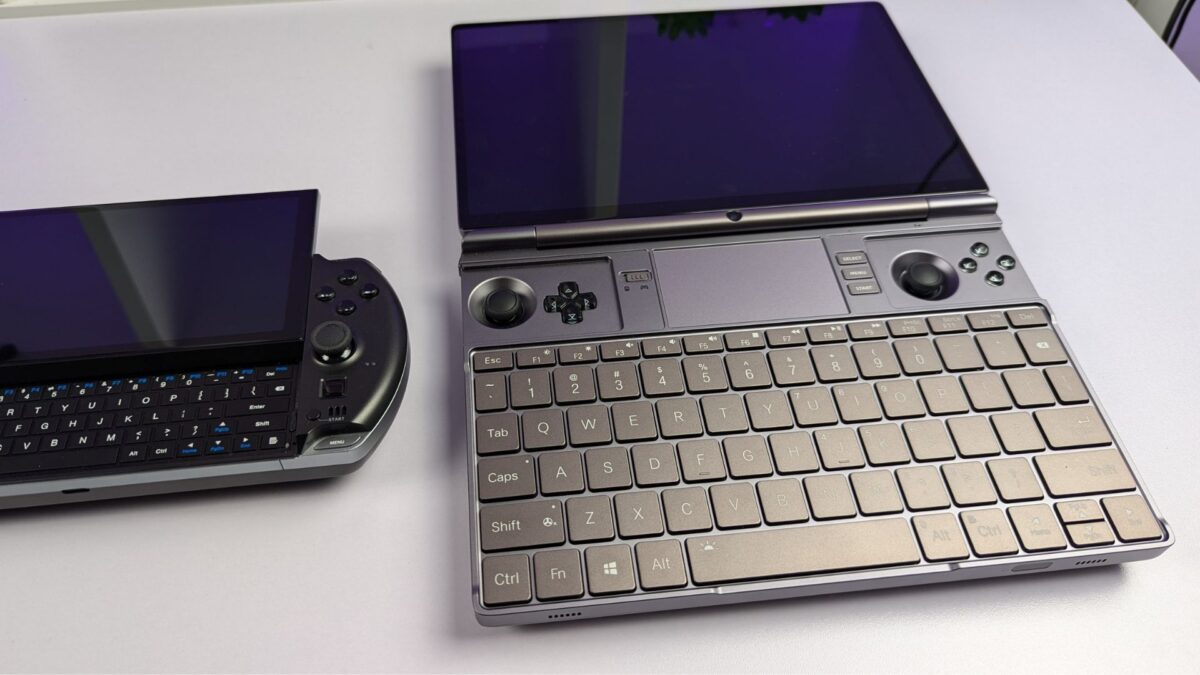
The WIN 4 2024 and WIN Mini 2024 are both small enough to easily fit in a bag, with the WIN Mini being the most compact. The WIN MAX 2 2024, with its larger size, might require a bigger bag but offers enhanced ease of use with its larger screen and keyboard.
Technical Specifications Comparison
The GPD WIN 4 2024, GPD WIN Mini 2024, and GPD WIN MAX 2 2024 share many core specifications but have some key differences:
CPU and GPU:
All three models feature the AMD Ryzen 7 8840U processor, which has 8 cores, 16 threads, and can boost up to 5.1GHz. This CPU is paired with the integrated AMD Radeon 780M GPU, featuring 12 compute units and capable of reaching up to 2700MHz
RAM:
The devices offer varying RAM configurations:
- GPD WIN 4 2024: Up to 64GB LPDDR5X at 6400 MT/s
- GPD WIN Mini 2024: 32GB or 64GB LPDDR5 at 6400 MT/s
- GPD WIN MAX 2 2024: 32GB or 64GB LPDDR5x at 6400MHz
Storage:
All models use M.2 NVMe SSDs with PCIe 4.0 support:
- GPD WIN 4 2024: 512GB, 2TB, or 4TB options
- GPD WIN Mini 2024: 512GB or 2TB options
- GPD WIN MAX 2 2024: 2TB or 4TB options
Communications:
All three devices feature Wi-Fi 6 and Bluetooth 5.2 connectivity
Battery:
Battery capacities differ:
- GPD WIN 4 2024: 45.62Wh Lithium Polymer battery
- GPD WIN Mini 2024: 44.24 Wh Lithium Polymer battery
- GPD WIN MAX 2 2024: 67Wh Li-polymer battery
Battery life varies depending on usage:
- GPD WIN 4 2024: About 1 hour 25 minutes under heavy load (Cinebench loop), 6-8 hours for average usage
- GPD WIN Mini 2024: About 1 hour 38 minutes under heavy load (Cinebench loop), 6-8 hours for average usage
- GPD WIN MAX 2 2024: About 1 hour 52 minutes under heavy load (Cinebench loop), 6-8 hours for average usage
I/O Ports:
The devices have slightly different port configurations:
- GPD WIN 4 2024: 1x USB4, 40Gbps, 1x USB 3.2 Gen 2 Type-C 10Gbps, 1x USB 3.2 Gen 2 Type-C Charging Only, 1x Oculink (SFF-8612), 1x 3.5mm headphone port
- GPD WIN Mini 2024: 1x USB4 (40Gbps), 1x USB 3.2 Gen 2 Type-C (10Gbps), 1x USB A (10Gbps), 1x Micro SD card slot, 1x 3.5mm audio jack
- GPD WIN MAX 2 2024: 1x USB 4, 1x USB 3.2 Gen 2 Type-C, 1x USB 3.2 Gen 2 Type-A, 1x OcuLink (SFF-8612), 1x HDMI, 1x Micro SD card reader, 1x SD card reader, 1x 3.5mm audio port
Display:
- GPD WIN Mini 2024: 7″ LTPS touchscreen, 1920×1080 resolution, 314 PPI, 60Hz/120Hz VRR supported
- GPD WIN MAX 2 2024: 10.1″ IPS touchscreen, 1920×1200 resolution, supports up to 2560×1600, 16:10 aspect ratio, 299 PPI
- GPD WIN 4 2024: 6-inch H-IPS touchscreen display with 1920 × 1080 resolution
The main differences lie in the form factor, screen size, battery capacity, and some I/O configurations. The WIN MAX 2 2024 offers the largest screen and battery, while the GPD WIN 4 2024 is the most compact. The WIN 4 2024 sits between them in terms of size but offers a unique slide-up keyboard design.
Display Size Comparison
The GPD WIN 4 2024, GPD WIN Mini 2024, and GPD WIN MAX 2 2024 offer distinct screen sizes that cater to different use cases.
The GPD WIN 4 2024 features a 6-inch H-IPS touchscreen display with 1920×1080 resolution. This compact screen size is ideal for portable gaming, offering a good balance between visibility and pocket-friendliness. It’s suitable for quick gaming sessions on-the-go but may be less comfortable for extended office work or productivity tasks.
The GPD WIN Mini 2024 boasts a slightly larger 7-inch LTPS touchscreen with 1920×1080 resolution and 60Hz/120Hz variable refresh rate. This screen size enhances the gaming experience while maintaining portability. It’s better suited for longer gaming sessions and can handle basic productivity tasks, though it may still feel cramped for extensive office work.
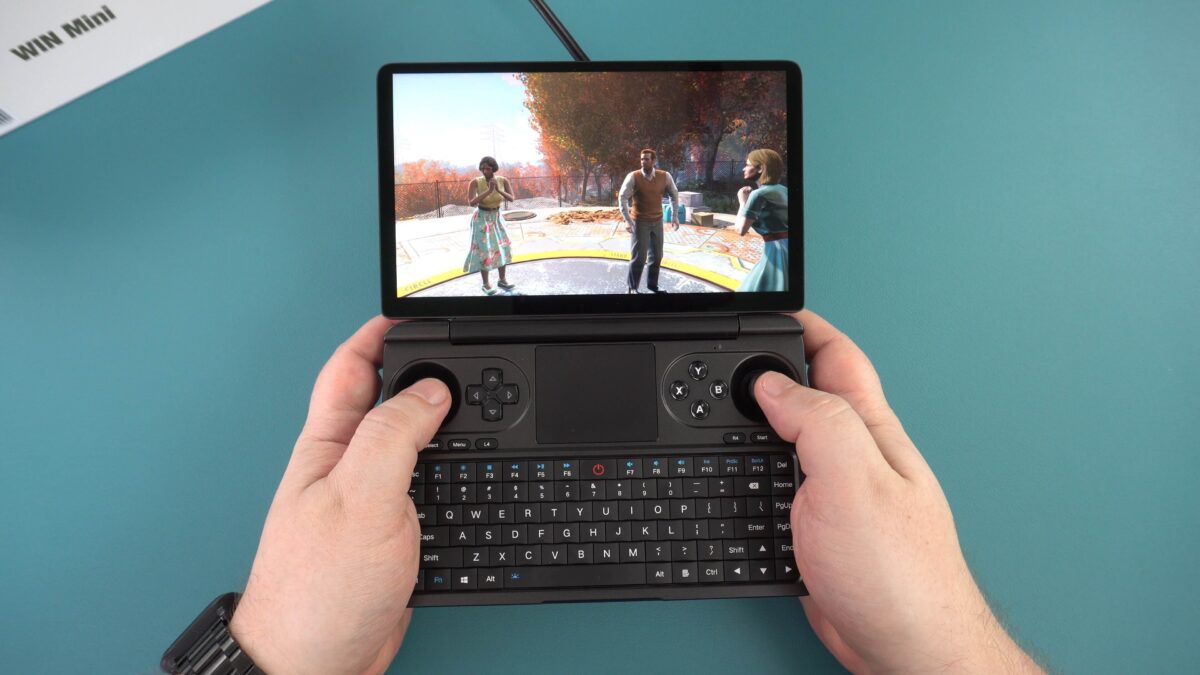
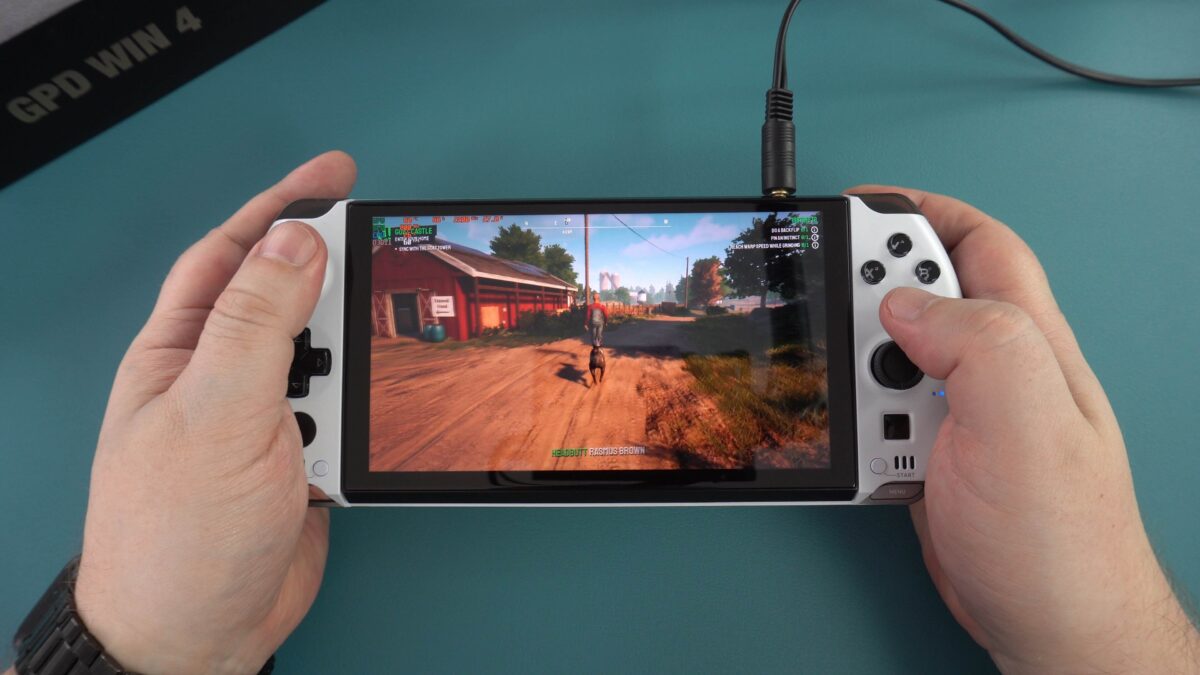
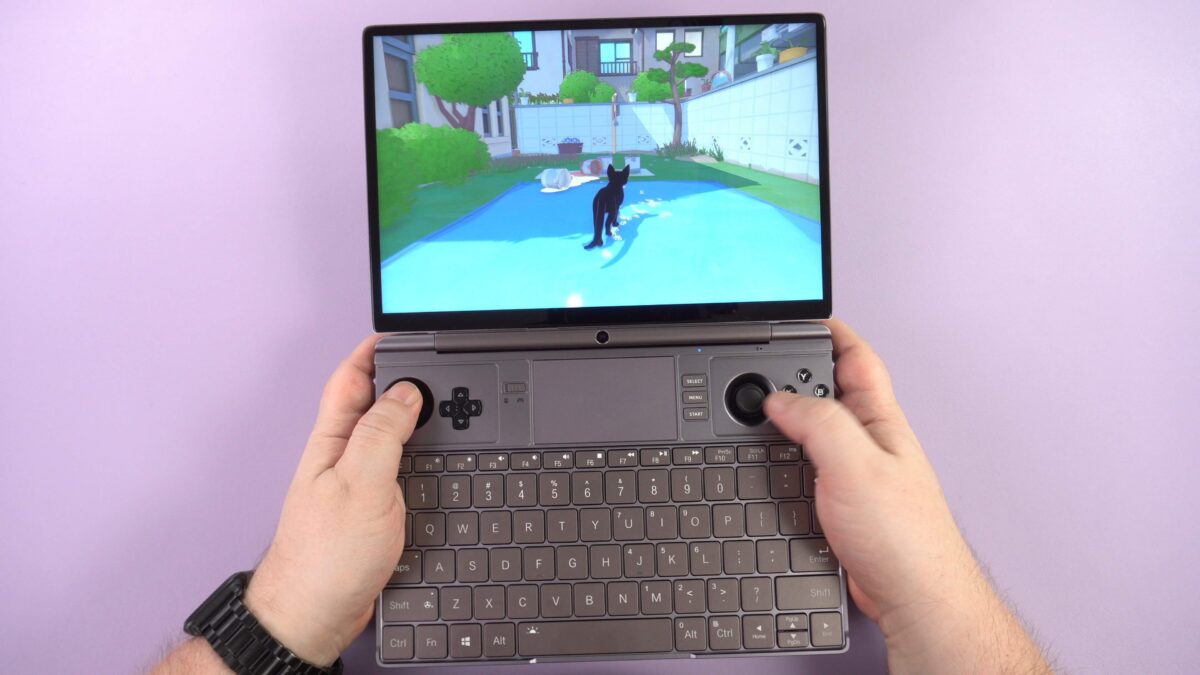
The GPD WIN MAX 2 2024 stands out with its 10.1-inch IPS touchscreen, supporting resolutions up to 2560×1600. This larger display is the most versatile, excelling in productivity tasks, office work, and content creation. It provides ample screen real estate for multitasking, document editing, and image/video editing. For gaming, it offers an immersive experience, though at the cost of reduced portability compared to its smaller counterparts.
For gaming, the WIN Mini 2024 and WIN 4 2024 are ideal for portable play, with the WIN Mini offering a slight edge in screen size. The WIN MAX 2 2024 provides the most comfortable gaming experience for extended sessions. For office work and productivity, the WIN MAX 2 2024 is clearly superior, offering a laptop-like experience that’s suitable for long work sessions, especially when compared to handheld PCs. The smaller screens of the WIN 4 and WIN Mini are less ideal for extended productivity tasks, often requiring external displays or portable monitors for comfortable use
System Benchmark Comparison
The GPD WIN 4 2024, GPD WIN Mini 2024, and GPD WIN MAX 2 2024 all feature the AMD Ryzen 7 8840U processor, which should lead to similar overall performance across the devices. However, there are some notable differences in benchmark results:
PCMark:
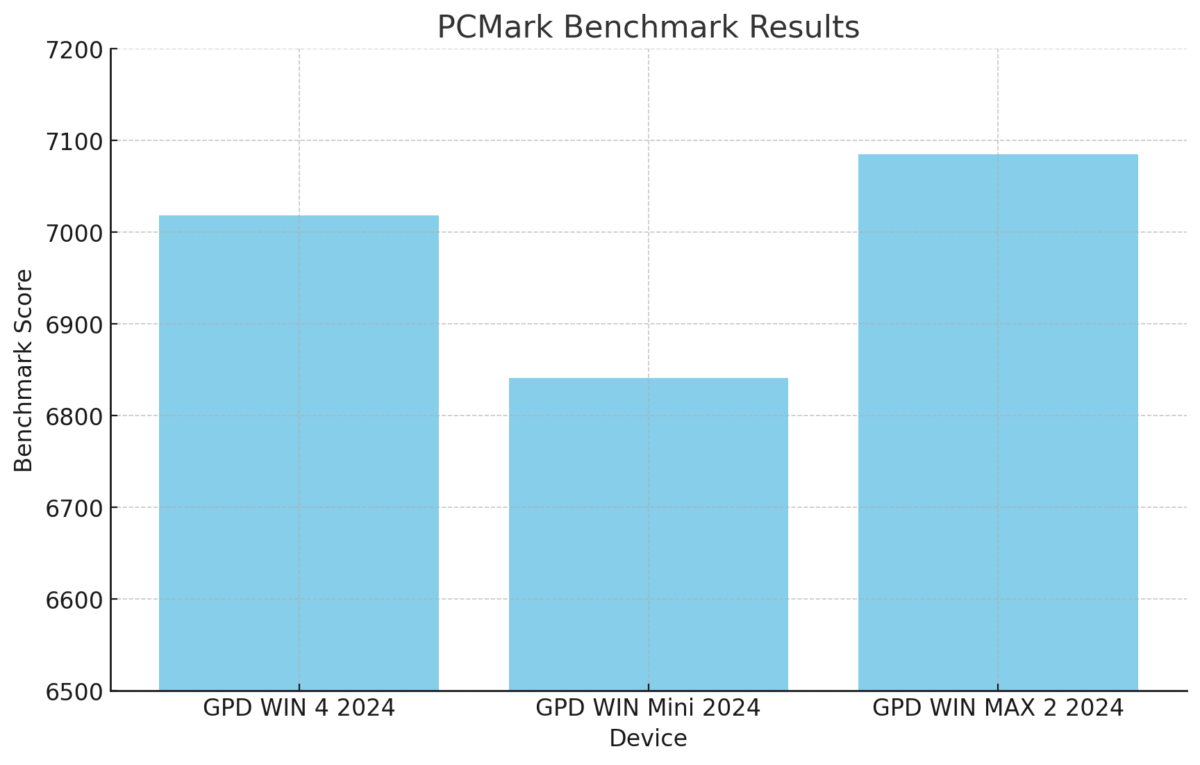
The GPD WIN MAX 2 2024 takes a slight lead, with the WIN 4 2024 close behind, while the WIN Mini 2024 lags slightly
Cinebench:
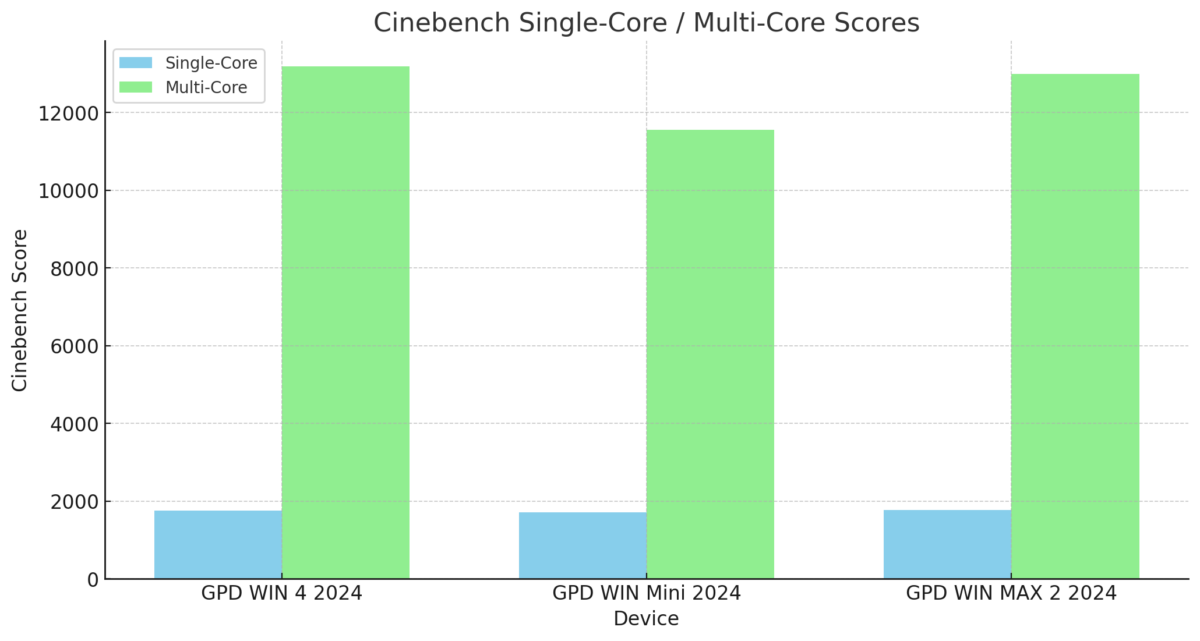
The WIN MAX 2 2024 and WIN 4 2024 performing similarly on average. The WIN Mini 2024 shows slightly lower performance, especially in multi-core tasks
3DMark:
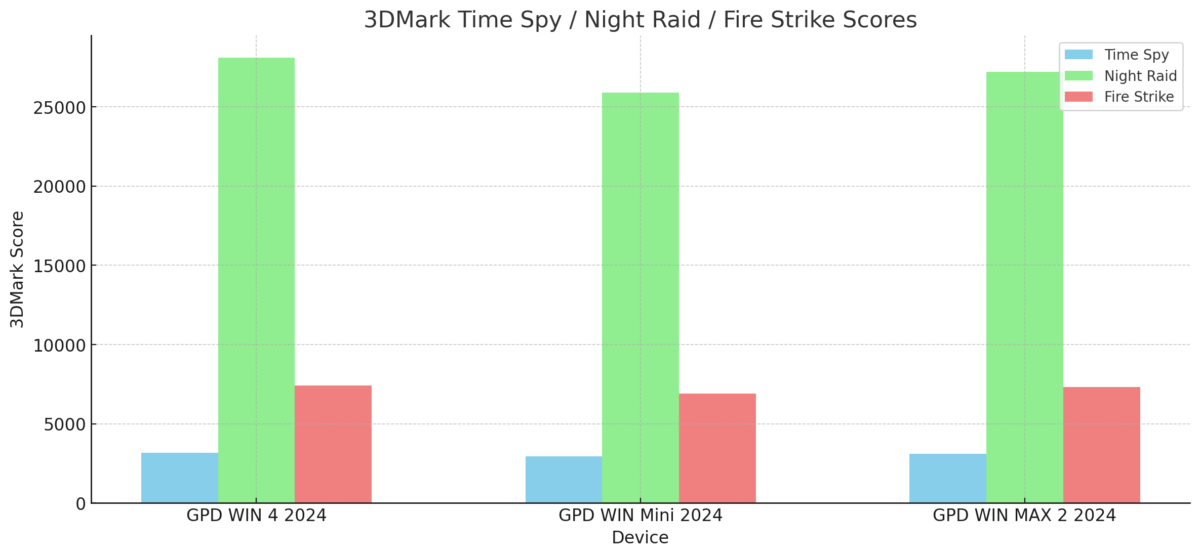
The GPD WIN 4 2024 shows the highest scores among the provided data with the WIN MAX 2 2024 in second place. The WIN Mini 2024 appears to have slightly lower performance in 3DMark tests.
Overall, while the devices share the same processor, there are slight performance differences:
- The GPD WIN MAX 2 2024 generally shows the highest benchmark scores, likely due to its larger form factor allowing for better cooling and potentially higher sustained performance
- The GPD WIN 4 2024 performs very similarly to the WIN MAX 2 2024, often beating or coming close to its scores
- The GPD WIN Mini 2024 tends to have slightly lower benchmark scores compared to the other two, possibly due to its more compact design affecting thermal performance
However, it’s important to note that these differences are relatively minor, and all three devices offer strong performance for their size. The choice between them may come down more to form factor preferences and specific use cases rather than raw performance differences.
Gaming Performance Comparison on the handheld PCs
The gaming benchmark performance of the GPD WIN 4 2024, GPD WIN Mini 2024, and GPD WIN MAX 2 2024 shows some notable differences, despite all three devices featuring the AMD Ryzen 7 8840U processor. Here’s a detailed comparison of their gaming performance:
Forza Horizon 5:
The GPD WIN Mini 2024 shows good results in 720p benchmark tests, but experiences a performance drop compared to the WIN 4 2024 as the TDP increases. At 1080p, the WIN Mini 2024 achieves a rather low average frames per second. The GPD WIN MAX 2 2024 and WIN 4 2024 demonstrate slight improvements over previous models, with the WIN MAX 2 2024 having a minor edge
Call of Duty Games:
The GPD WIN Mini 2024 performs well in Call of Duty games, showing a good mix of first and second place results against the WIN 4 2024, making it a strong contender in the handheld PC market. However, at higher TDP settings, the WIN Mini 2024 experiences a performance drop. The WIN 4 2024 and WIN MAX 2 2024 both show strong performance at 1080p, with the WIN 4 2024 often taking the lead
Street Fighter 6:
At 1080p and 28W TDP, the GPD WIN Mini 2024 shows lower performance compared to both the GPD WIN 4 2024 and even the original GPD WIN Mini, albeit with only one or two frames difference
General Performance Trends:
- GPD WIN MAX 2 2024: Generally shows the highest benchmark scores among the three devices. Its larger form factor likely allows for better cooling and potentially higher sustained performance
- GPD WIN 4 2024: Performs very similarly to the WIN MAX 2 2024, often matching or coming close to its scores, making it a reliable choice for PC gaming. It consistently shows strong performance across various games
- GPD WIN Mini 2024: Tends to have slightly lower benchmark scores compared to the other two models, which may affect its appeal for serious gaming on a handheld PC. Its compact design may affect thermal performance, leading to some performance drops, especially at higher TDP settings or in more demanding games
Performance Variability:
It’s worth noting that the performance differences between these devices can vary depending on the specific game and settings. While the GPD WIN Mini 2024 generally shows lower performance, it still performs well in many scenarios, particularly at lower resolutions or TDP settings. In conclusion, while all three devices offer capable gaming performance, there are some notable differences:
- The GPD WIN MAX 2 2024 and WIN 4 2024 generally offer the best gaming performance, with the WIN MAX 2 2024 having a slight edge in some scenarios.
- The GPD WIN Mini 2024, while still capable, tends to show lower performance in more demanding scenarios or at higher settings, likely due to thermal constraints.
These performance differences should be considered alongside other factors such as portability, form factor, and specific use cases when choosing between these devices
eGPU OCuLink Compatibility and Performance
The GPD WIN 4 2024, GPD WIN Mini 2024, and GPD WIN MAX 2 2024 all offer eGPU compatibility such as the GPD G1 eGPU docking station, but with some notable differences in connectivity options and performance:
The GPD WIN 4 2024 and GPD WIN MAX 2 2024 feature both OCuLink and USB4 ports, providing versatile eGPU connectivity options. The OCuLink port offers a direct PCIe connection with 63Gbps effective bandwidth, while the USB4 port provides 40Gbps bandwidth. This dual connectivity allows for optimal eGPU performance, particularly with the GPD G1 graphics dock. In contrast, the GPD WIN Mini 2024 only supports eGPU connectivity via its USB4 port, lacking the OCuLink option.
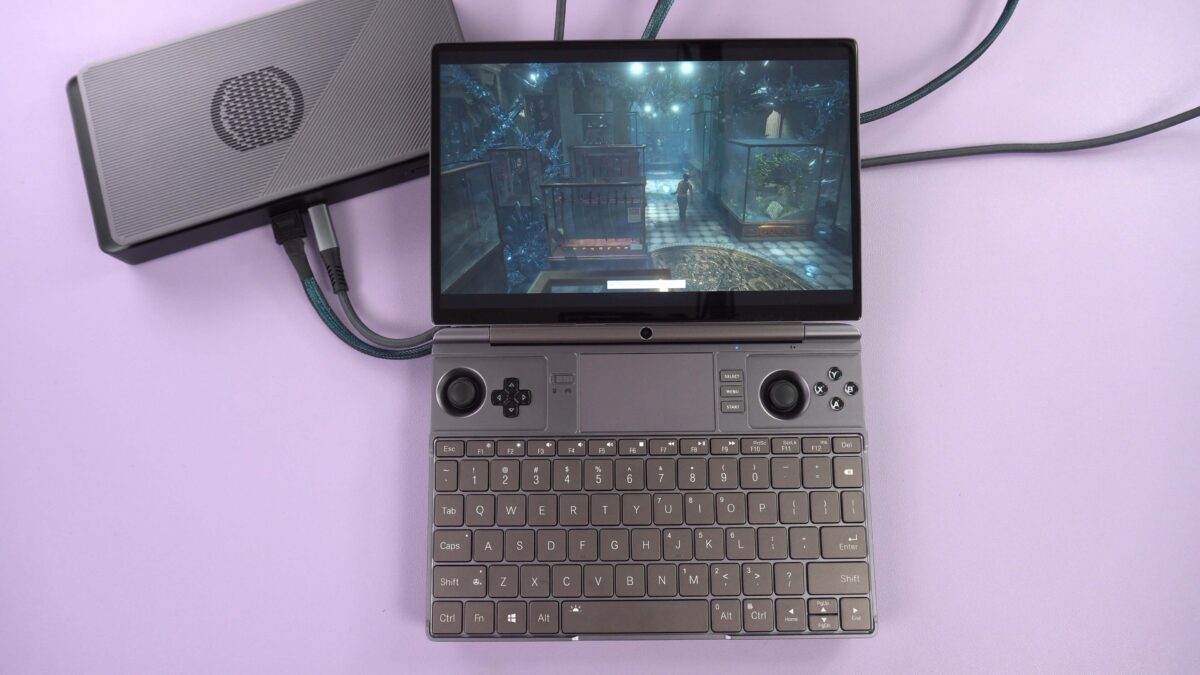
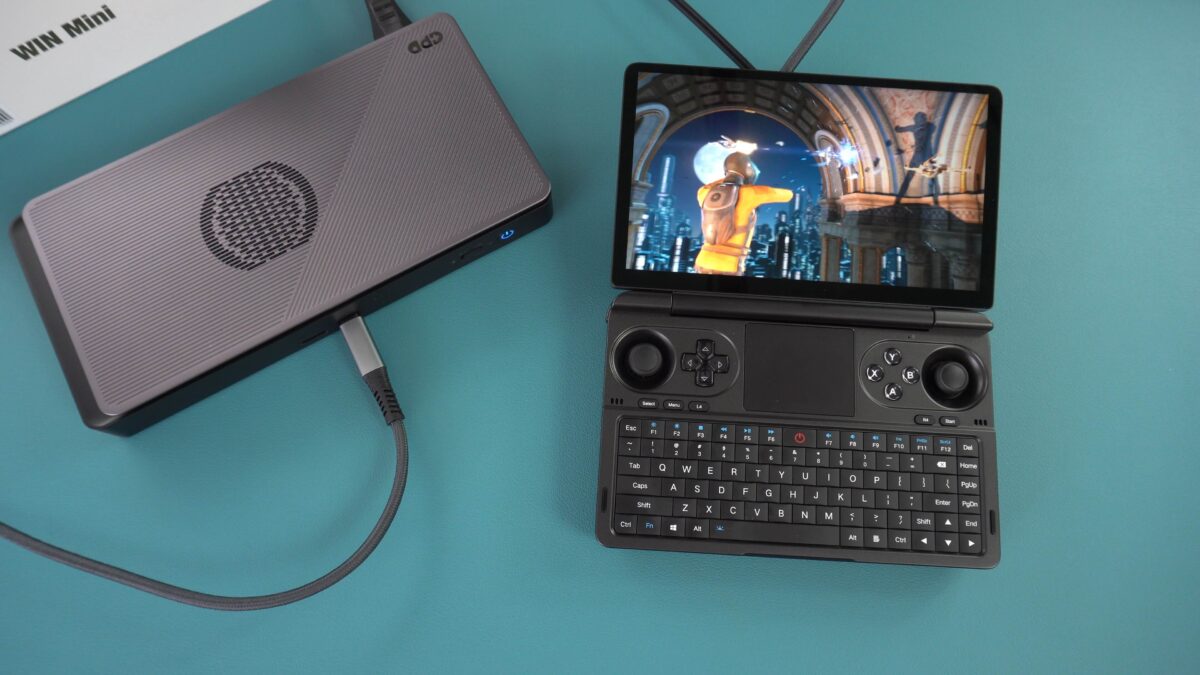
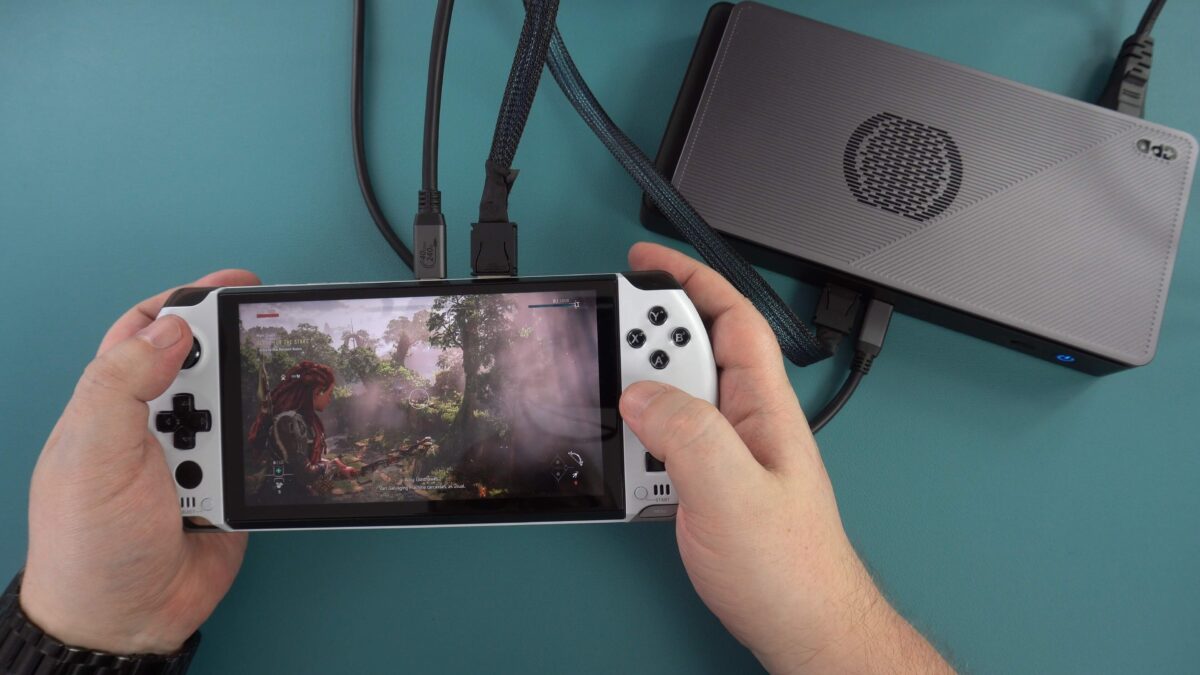
Performance-wise, the OCuLink connection generally offers superior eGPU performance due to its direct PCIe connection and higher bandwidth. Users have reported that some games with heavy workloads between CPU and GPU perform better with OCuLink compared to USB4. However, the USB4 connection still provides good eGPU performance and offers the advantages of being plug-and-play, hot-swappable, and very stable.
The presence of OCuLink in the WIN 4 2024 and GPD WIN MAX 2 2024 gives them an edge in eGPU performance over the WIN Mini 2024, especially in demanding gaming scenarios.
Productivity and Work Features
The GPD WIN 4 2024, GPD WIN Mini 2024, and GPD WIN MAX 2 2024 offer varying levels of productivity capabilities, with some key differences in their suitability for office work, content creation, and video conferencing:
Office Productivity:
All three devices can handle basic office tasks like document editing, spreadsheet work, and email. However, the GPD WIN MAX 2 2024 stands out for productivity due to its larger 10.1-inch screen and more spacious keyboard, resembling a mini laptop experience. Users report achieving about 90% normal touch typing speed and accuracy on the WIN MAX 2.
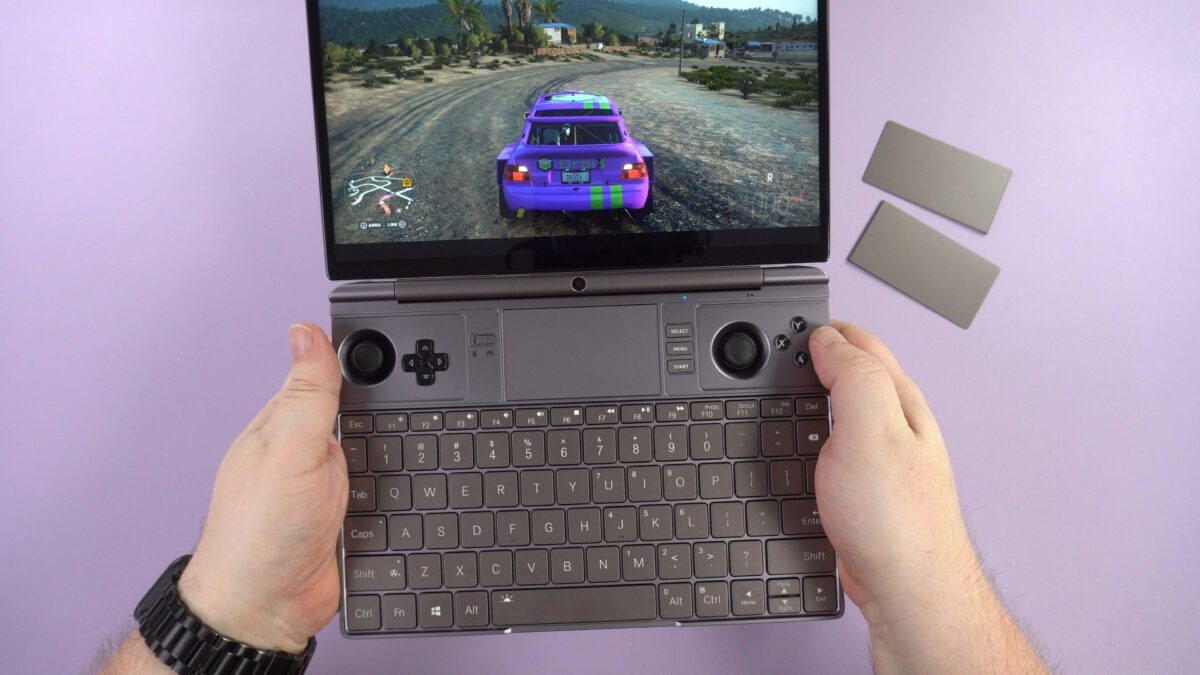
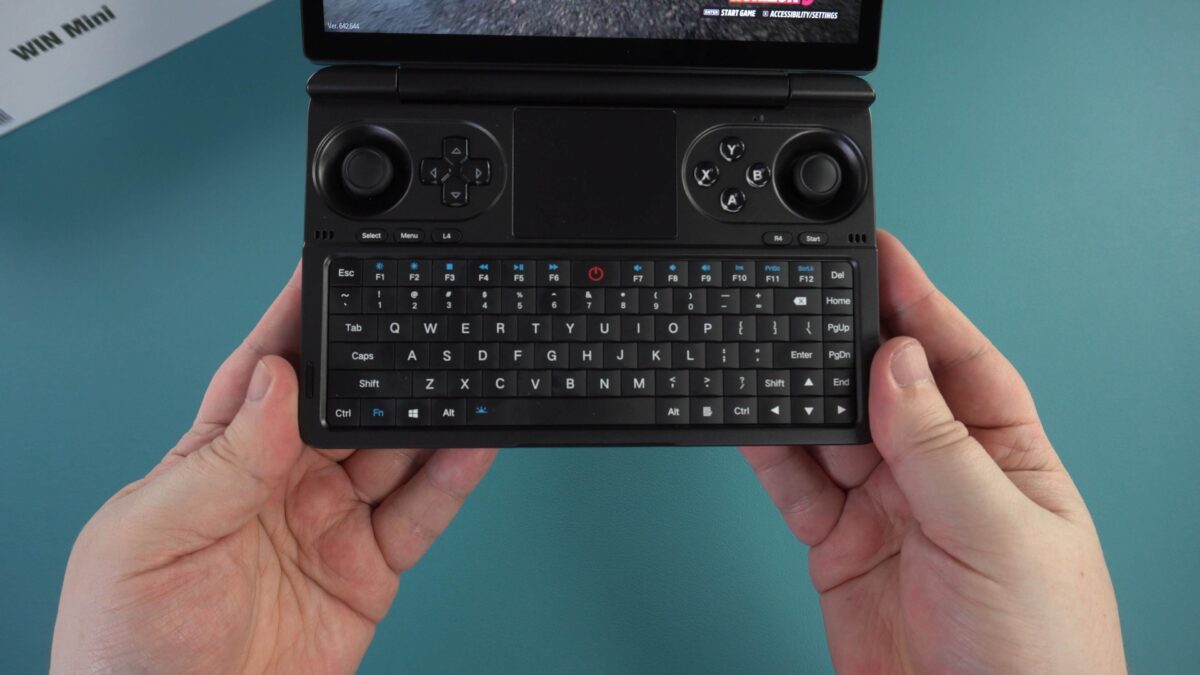
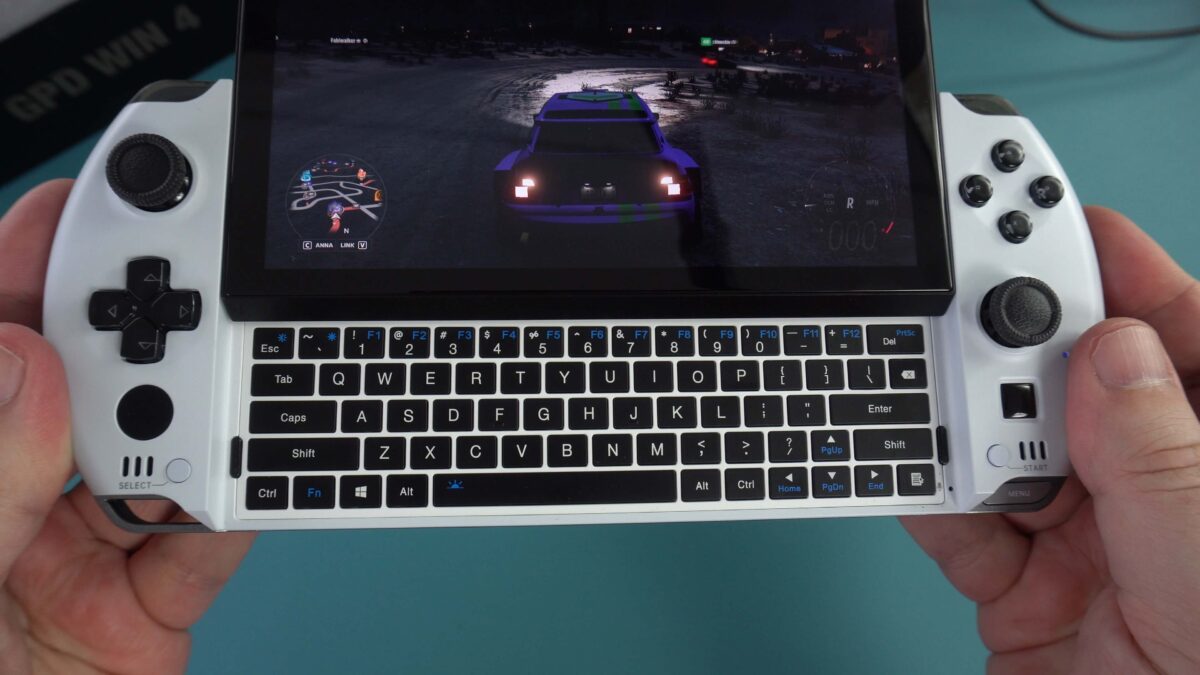
The GPD WIN 4 2024 and WIN Mini 2024, while capable, are less ideal for extended typing sessions due to their smaller keyboards. For the WIN 4 2024 and WIN Mini 2024, users often recommend connecting external peripherals for serious productivity work. As one user noted, “Don’t get me wrong though, they both suck at it without hooking them up to monitors/peripherals.”
Image and Video Editing:
All three devices can handle light image and video editing tasks thanks to their powerful AMD Ryzen 7 8840U processors and integrated Radeon 780M graphics. However, the larger screen of the WIN MAX 2 2024 provides a better workspace for these tasks. For more demanding editing work, users might consider connecting an external monitor or using an eGPU for additional graphics power.
Video Conferencing:
The GPD WIN MAX 2 2024 is equipped with a built-in 2MP camera and microphone, making it ideal for video conferencing right out of the box. The WIN 4 2024 and WIN Mini 2024 do not have integrated cameras., users of these devices will need to rely on external webcams for video calls.
Other Productivity Considerations:
- Portability vs. Usability: The WIN Mini 2024 offers extreme portability but sacrifices some usability for productivity tasks. The WIN MAX 2 2024 provides the best balance for productivity but is less portable
- Docking Capabilities: All three devices can be connected to external monitors, keyboards, and mice, significantly enhancing their productivity potential
- Battery Life: The WIN MAX 2 2024 has the largest battery capacity at 67Wh, potentially offering longer work sessions without needing to recharge
- Multitasking: The larger screen of the WIN MAX 2 2024 allows for better multitasking, especially when working with multiple documents or applications simultaneously
- Ergonomics: For extended work sessions, the WIN MAX 2 2024’s larger form factor may be more comfortable, reducing strain from working on a very small device
In conclusion, while all three devices can handle productivity tasks to some extent, the GPD WIN MAX 2 2024 is generally the most suitable for serious work due to its larger screen, better keyboard, and built-in webcam. The WIN 4 2024 and WIN Mini 2024 are more focused on portability and gaming, with productivity as a secondary consideration. For users prioritizing productivity, the WIN MAX 2 2024 offers the best balance of performance and usability among the three options.
Gaming Comfort and Performance
When comparing the GPD WIN 4 2024, GPD WIN Mini 2024, and GPD WIN MAX 2 2024 for gaming, each device offers unique advantages:
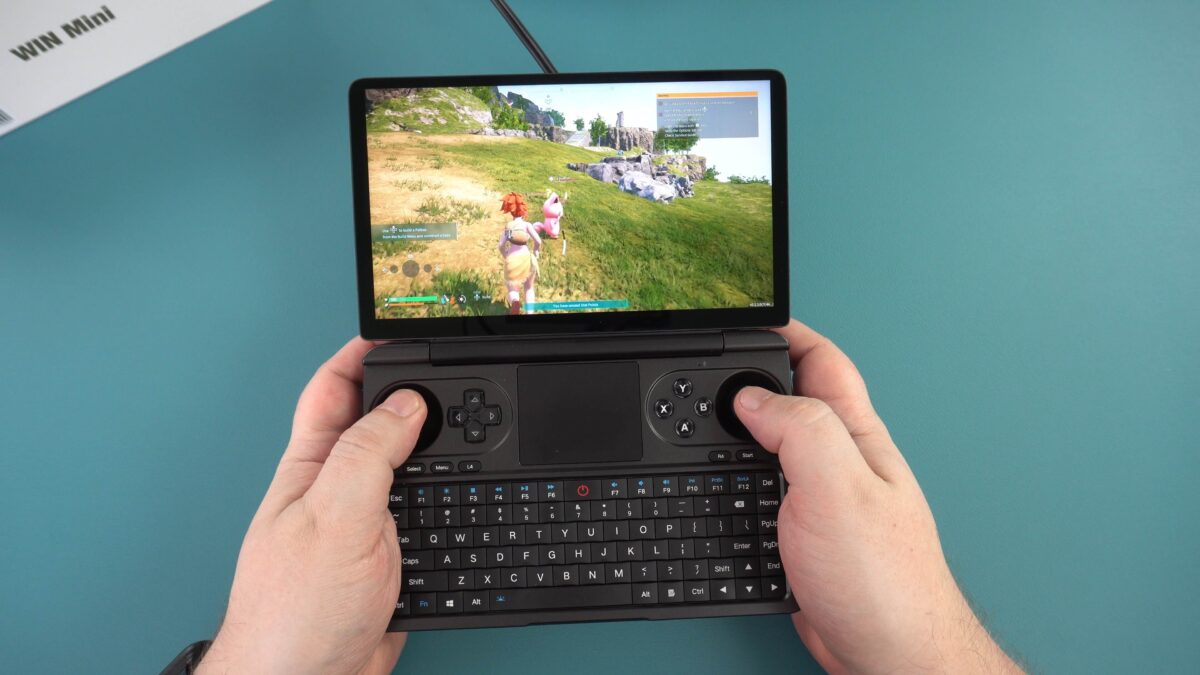
The GPD WIN Mini 2024 excels in portability, making it ideal for on-the-go gaming. Its compact size allows for easy pocketability and extended handheld use without fatigue. The 7-inch LTPS touchscreen with 1920×1080 resolution and 60Hz/120Hz variable refresh rate provides a crisp gaming experience. However, its smaller form factor may lead to some thermal constraints, potentially impacting performance in demanding games
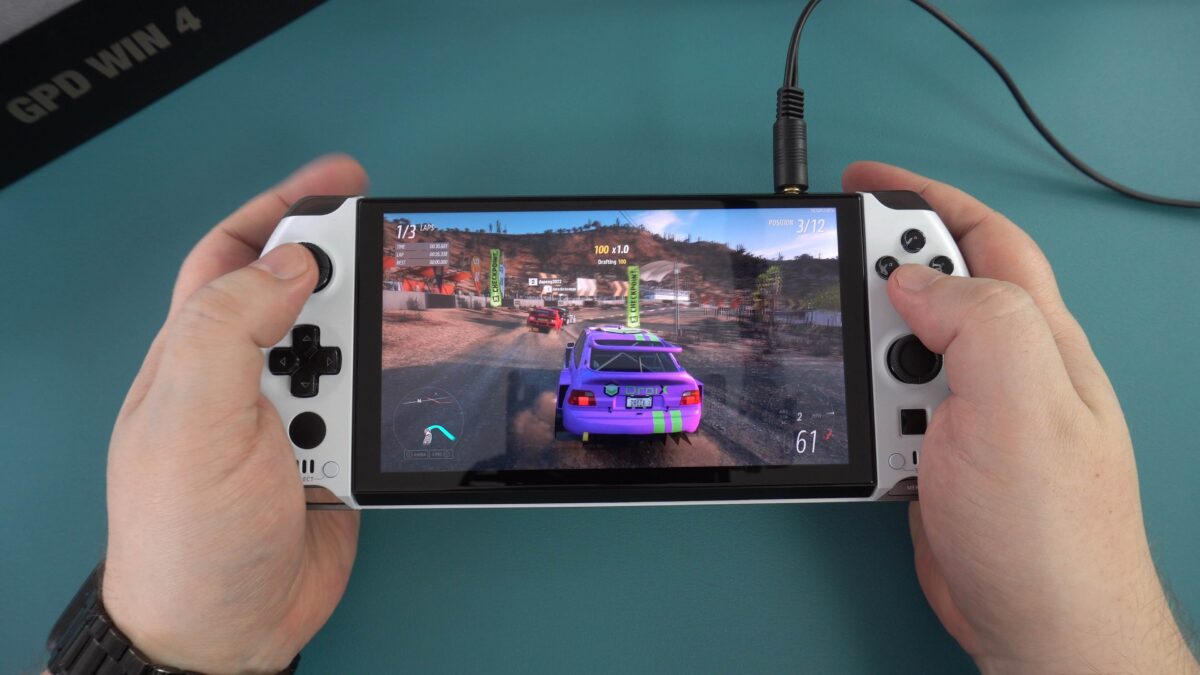
The GPD WIN 4 2024 strikes a balance between portability and usability. Its slide-up design offers a more comfortable gaming experience compared to the Mini, while still maintaining good portability. The 6-inch H-IPS touchscreen delivers good visual quality, and its performance in gaming benchmarks often matches or exceeds the larger WIN MAX 2.
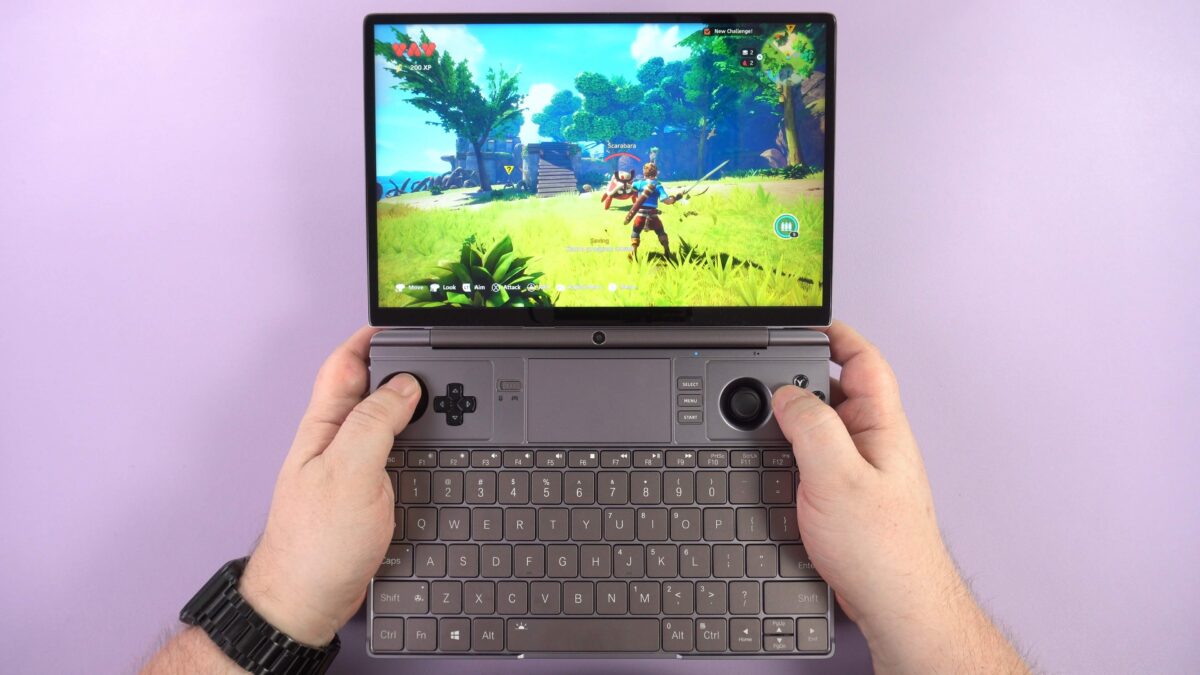
The GPD WIN MAX 2 2024 provides the most laptop-like experience with its larger 10.1-inch IPS touchscreen. It offers the best performance among the three, likely due to better thermal management in its larger chassis. The bigger screen and more spacious controls make it comfortable for extended gaming sessions on a mini laptop, but it’s the least portable option.
In terms of raw gaming performance, the WIN MAX 2 2024 generally leads, followed closely by the WIN 4 2024, with the GPD WIN Mini 2024 showing slightly lower performance in demanding scenarios. However, all three devices are capable of running modern games, with the choice ultimately depending on the user’s preference for portability versus screen size and comfort.
A Summary of the handhelds Pros and Cons
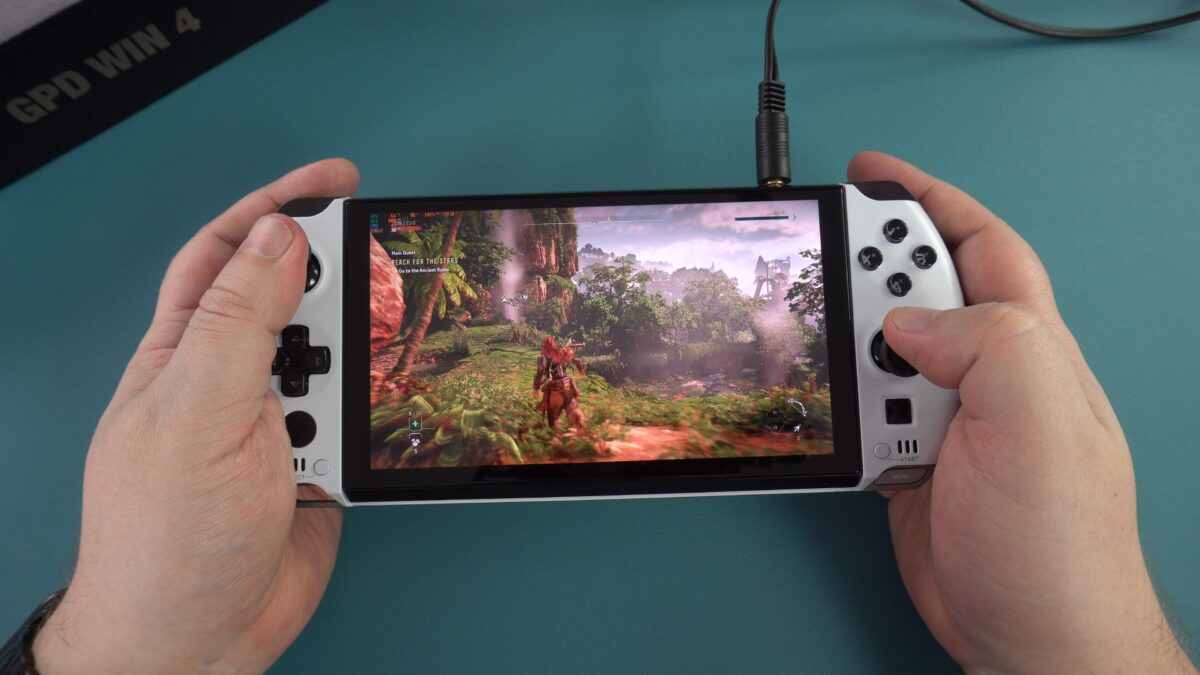
The GPD WIN 4 2024 offers a balanced mix of portability and performance.. Its slide-up design with a 6-inch screen strikes a good compromise between gaming comfort and pocket-friendliness. It features strong gaming performance, often matching the larger WIN MAX 2, and supports both OCuLink and USB4 for versatile eGPU connectivity. The device excels in heat management, maintaining comfortable temperatures even during extended gaming sessions, However, its smaller keyboard may be less suitable for prolonged productivity tasks, and the lack of a built-in webcam could be a drawback for video conferencing on a mini laptop. Read our full GPD WIN 4 2024 review here.
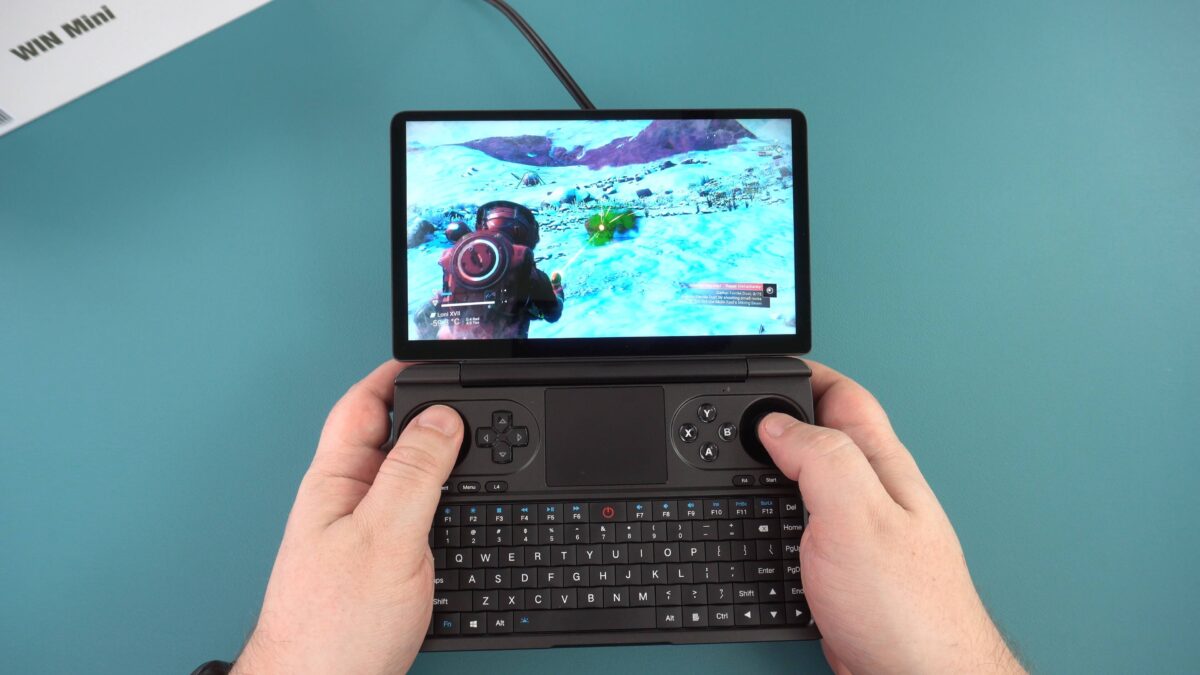
The GPD WIN Mini 2024 prioritizes extreme portability with its ultra-compact 7-inch clamshell design, making it the most pocket-friendly option. It offers a smooth 120Hz refresh rate and good gaming performance for its size. However, it faces some thermal challenges, with temperatures reaching around 70°C during intense gaming. The Mini lacks OCuLink support, limiting its eGPU performance compared to its siblings. While capable of basic productivity tasks, its small form factor makes it less ideal for extended work sessions without external peripherals. Read our in-depth GPD WIN Mini 2024 review here.
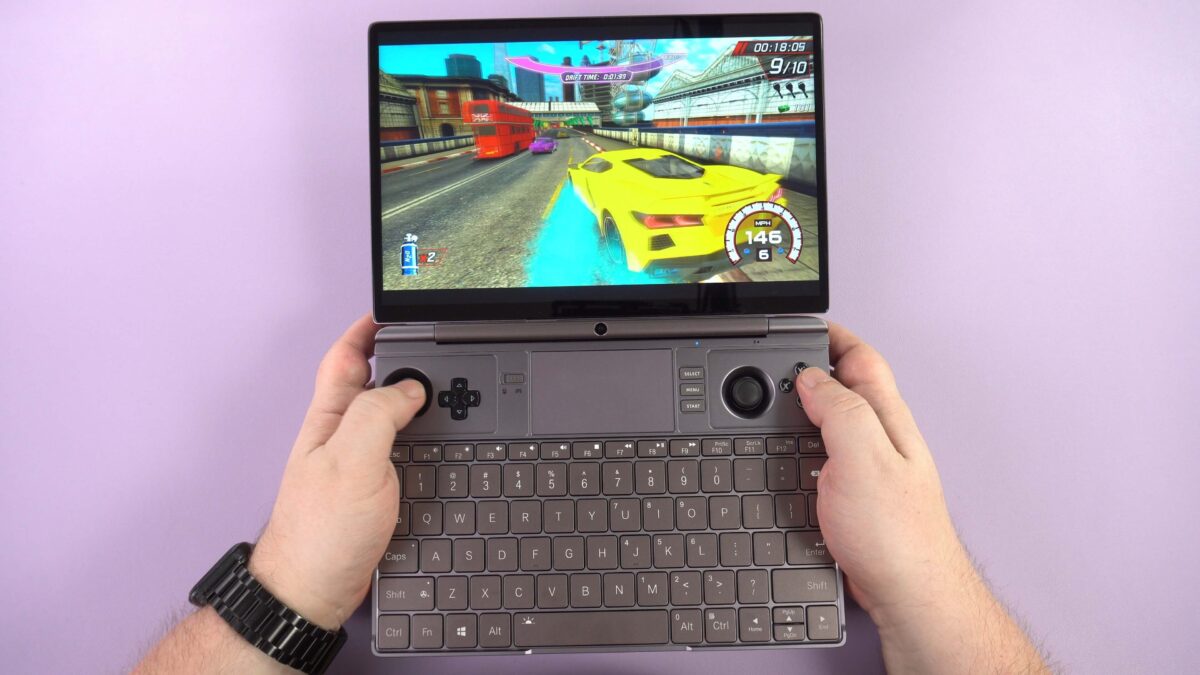
The GPD WIN MAX 2 2024 stands out with its larger 10.1-inch display and more spacious design, offering the best productivity experience among the three. It generally provides the highest benchmark scores and gaming performance, likely due to better thermal management in its larger chassis compared to other handheld PCs.
The WIN MAX 2024 excels in multitasking, office work, and content creation, with a built-in webcam for video conferencing.. It supports both OCuLink and USB4 for optimal eGPU performance. However, its larger size makes it the least portable option, potentially requiring a bigger bag for transport. Despite its advantages in performance and usability, some users might find it too large for comfortable handheld gaming sessions compared to its more compact counterparts. Read our GPD WIN MAX 2 2024 review here.
Share Your Device Choice
Now that you’ve seen the detailed comparison of the GPD WIN 4 2024, GPD WIN Mini 2024, and GPD WIN MAX 2 2024, which device would you choose for your gaming and productivity needs? Each model offers unique advantages, from extreme portability to enhanced performance and productivity features.
We’d love to hear your thoughts! Share your choice and the reasons behind it in the comments below. Are you leaning towards the compact powerhouse GPD WIN 4, the ultra-portable GPD WIN Mini, or the versatile GPD WIN MAX 2? Let us know how these devices align with your specific requirements and use cases for gaming or productivity on a laptop.

